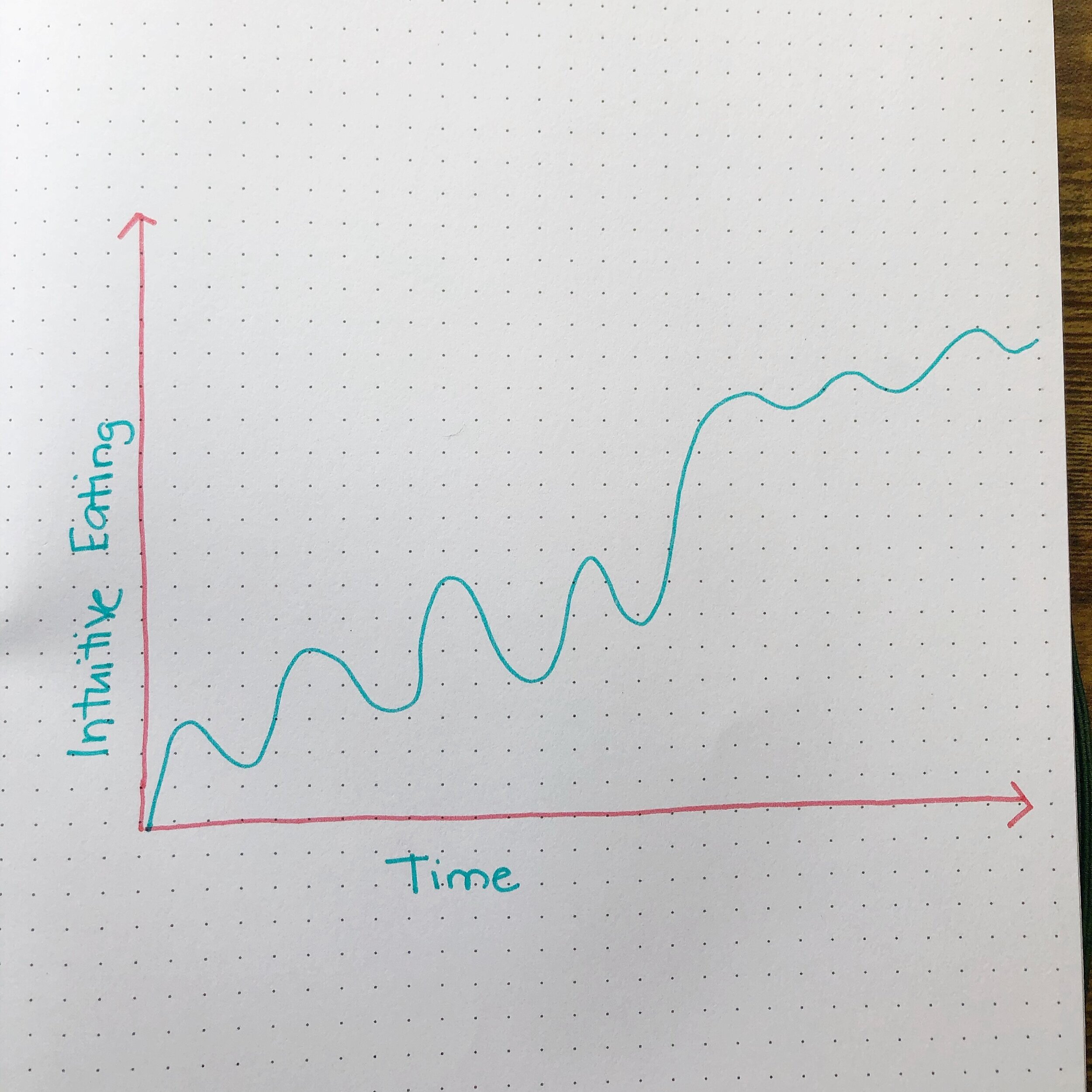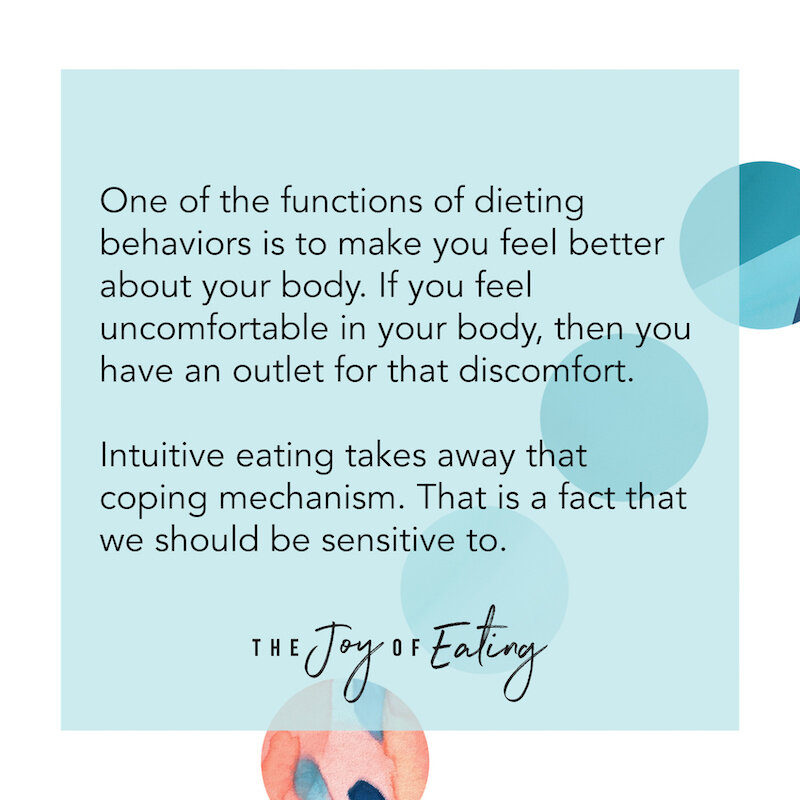Three Common Challenges in Intuitive Eating
Intuitive eating is a journey, one with plenty of ups and downs along the way. In this post, I discuss three common challenges in intuitive eating along with tips for how to move past them.
Although eating intuitively eventually becomes, well, intuitive, in the beginning it's hard. Like, really hard. It's the opposite of what you’re likely used to with dieting, which starts off easy with all its clear rules to tell you whether you’re doing it right or wrong. Of course, over time dieting becomes harder to stick to, as your biology fights back against the restriction, and the inevitable ups and downs of life knock you off course.
But regardless, in the beginning of a diet, there’s often a dieters “high” that you just don’t typically get with intuitive eating. Because intuitive eating is a practice, a skill that you hone over time, when you start trying to eat more intuitively you’re more likely to feel confused and overwhelmed and probably a bit scared.
Over time, I find the journey of intuitive eating looks a bit like this…
There’s lots of ups and downs at first, and over time you build more confidence in how you’re feeding yourself, and more attuned to your body and its needs. But even when you feel pretty solid as an intuitive eater, there’s still ups and downs (and sometimes bigger ones than I’ve drawn this chart to represent).
In those times where you’re sliding down on the chart, it’s easy to feel like you’re failing. These challenges are really just learning opportunities, and as you can see there’s an upswing on the other side. But sometimes those challenges become a bit of a stuck point. In my years of practice helping clients become more intuitive eaters, I've noticed three common challenges in intuitive eating, points where clients often come to me feeling like they're failing. Do any of these sound familiar to you?
Intuitive Eating Challenge #1: "I'm feel like I'm obsessing about food all the time"
Pretty early in the intuitive eating process, I often hear from client that they feel like they're always thinking about food and eating. I find this is especially true for those who live a fast paced lifestyle, where food choices are often reflexive, based on either what’s “allowed” on their diet or what’s available. It can feel pretty frustrating, because I mean, wasn't the whole point of intuitive eating to not obsess over food?
When diet mentality is making your food choices, in a sense, food decisions are easy. You just follow the rules, whatever they may be. Yes to kale salad. No to fried chicken sandwich. Yes to whatever has has the least grams of carbohydrate. No to anything with bread, pasta, rice, etc.
With intuitive eating, you're learning how to make food choices based on a combination of body knowledge (i.e. internal cues like hunger/fullness, what you're craving, how foods make you feel, etc) and brain knowledge (when am I going to eat again, what food is available, etc). If you've been ignoring those things, there needs to be some time spent tuning back in, which may feel like a lot of work, and may take up quite a bit of headspace. That, combined with the fact that the food police are still pretty loud inside your head, can make it feel like you are obsessing about food all the time.
If this is an intuitive eating challenge that you’re experiencing, I think it’s really helpful to have a place where you can get outside your head and talk about your intuitive eating journey with other people. Whether it’s a therapist or dietitian who is training in intuitive eating, a friend going through a similar process, or an intuitive eating facebook group, it’s really helpful to get your thoughts out of the anxious brain soup that diet mentality can cook up!
Intuitive Eating Challenge #2: "I feel worse about my body"
One of the functions of dieting behaviors is to make you feel better about your body. If you feel uncomfortable in your body, then you have an outlet for that discomfort.
With both intuitive eating, eating behaviors change before body image. Which means there's this uncomfortable time where you're eating more consistently and adequately, and giving yourself more permission with food, yet still dealing with a lot of discomfort in your body. This discomfort is magnified if you’re someone for whom healing from a disordered relationship with food means weight gain, or someone who is already in a larger body, and therefore not only receiving internal pressures to restrict food, but societal pressure as well. Without your usual coping mechanism, body image can feel pretty awful.
I wish I had an easy solution for this discomfort. I don’t. Body image is really complex, and a lot of it comes down to sitting in and through discomfort. It also means learning to challenge the societal messages we’ve received pretty much since birth about the value of different bodies based on their size, shape, color, ability, etc. If it’s accessible to you, working with a HAES-aligned therapist or dietitian on body image is incredibly helpful, or there are many free and low cost groups and resources out there (here’s a list of 95+ of them!).
At the end of the day, intuitive eating doesn’t require you to love your body - simply to respect it. No matter how you feel about your body, can you try to treat it more kindly? Even if you dislike, or even hate your body, it will always be there, doing its job trying to keep you alive. Can you at the very least, not abuse it through the restriction that dieting entails?
Intuitive Eating Challenge #3: "Food doesn't interest me anymore."
Decades ago there was a really famous (yet horribly cruel and inhumane) experiment done to examine the physiological and psychological effects of semi-starvation on healthy males, called the Minnesota Starvation Study. Participants were fed a “semi-starvation” level of calories, although it was a feast compared to many modern day diets. Some of the psychological effects were extreme - multiple participants had to drop out of classes and two were even admitted to the psych ward. But one of the more subtle psychological effects they noticed was that the men were suddenly obsessed with food, recipes and cooking. These men, like most typical men of the 1940s, had never been interested in cooking before, but started collecting recipes, reading cookbooks and talking about food all the time.
I see this in my clients in the form of spending hours pinning recipes, drooling over food pictures on instagram and spending their evenings in the kitchen cooking all their meals from scratch. If you ask them their hobby, they'll say food. But it's more than a hobby, it's an obsession.
As you mend your relationship with food, it becomes a lot less interesting. Food takes a backseat to other, more fulfilling things in life. Sometimes, food even feels boring or mundane! That can feel really sad, and can sometimes feel at conflict with the instagram image of intuitive eating, which often sounds like “loving every bite of food.” Goodness knows, even my blog name - The Joy of Eating - doesn’t reflect how mundane eating can feel at times.
If you connect with this intuitive eating challenge, I’ve found simply understanding and being able to identify what’s happening is really helpful for moving on. Although it can feel sad, food being more boring is actually a sign of healing! If you can, try to focus on what other areas of life you’re finding more joy in. It may even be helpful to make a list of the joys you’ve gained by making peace with food.
Do you connect with any of these three common challenges in intuitive eating? If these were stuck points you experienced, how did you move past?
If this blog post on three common challenges in intuitive eating was helpful, follow my pinterest board on intuitive eating for more support.
This post on three common challenges in intuitive eating was originally published July 2017. It has been updated to give you the best possible content.







